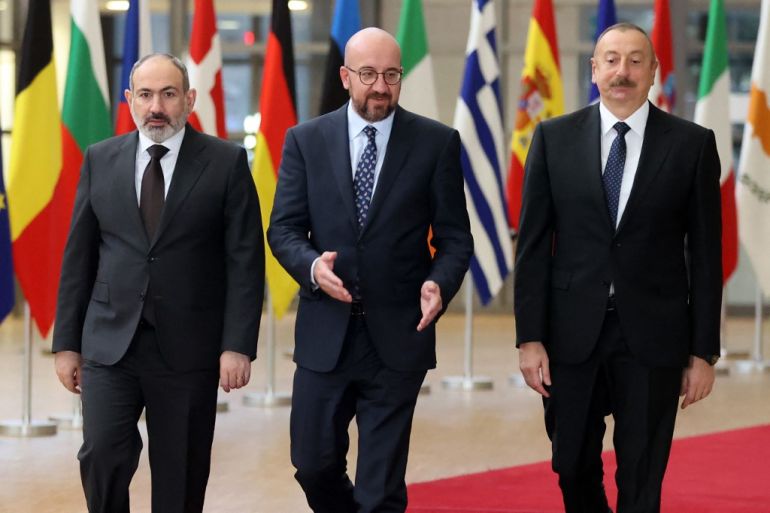Armenia, Azerbaijan gear up for Nagorno-Karabakh peace talks
Armenian and Azerbaijani leaders order their foreign ministers to begin preparation of a future peace treaty.

Armenia and Azerbaijan are preparing for peace talks, their officials said on Thursday, after a recent flare-up in the disputed Nagorno-Karabakh region.
Armenian Prime Minister Nikol Pashinyan and Azerbaijani President Ilham Aliyev met on Wednesday in Brussels for rare talks mediated by the European Council President Charles Michel.
Keep reading
list of 4 itemsAre Azerbaijan and Armenia ready to improve relations?
Azerbaijan accuses Armenia of ‘ethnic cleansing’ at UN court
Nagorno-Karabakh: Land still laced with mines, year after war
The meeting came after a flare-up in Nagorno-Karabakh on March 25 that allegedly saw Azerbaijan capture a strategic village in the area under the Russian peacekeepers’ responsibility, killing three Armenian separatist troops.
During the meeting, the two leaders “ordered foreign ministers to begin preparatory work for peace talks between the two countries”, the foreign ministry in Yerevan said in a statement.
“An agreement was reached during the meeting … to set up a bilateral commission on the issues of delimitation of the Armenian-Azerbaijan border, which will be in charge of ensuring security and stability along the frontier,” the ministry said.
Azerbaijan’s foreign ministry also said works were under way to begin peace talks, adding that the future peace treaty would be based “on the basic principles proposed earlier by Azerbaijan”.
The European Union said Michel “noted both President Aliyev’s and Prime Minister Pashinyan’s stated desire to move rapidly towards a peace agreement between their countries”.
“To this end, it was agreed to instruct Ministers of Foreign Affairs to work on the preparation of a future peace treaty, which would address all necessary issues,” it said in a statement.
Ceasefire violation
After the March incident, Moscow and Yerevan accused Azerbaijan of a ceasefire violation, a charge Baku has rejected, insisting its troops are in Azerbaijan’s sovereign territory.
Yerevan also called on Baku to start peace talks “without delay”. Baku agreed, saying it had already put forward such a proposal a year ago.
Baku tabled in mid-March its set of framework proposals for the peace agreement that includes both sides’ mutual recognition of territorial integrity, meaning Yerevan should agree on Nagorno-Karabakh being part of Azerbaijan.
Armenian foreign minister Ararat Mirzoyan sparked controversy at home when he said – commenting on the Azerbaijani proposal – that for Yerevan “the Nagorno-Karabakh conflict is not a territorial issue, but a matter of rights” of the local ethnic-Armenian population.

Long-contested between the Caucasus neighbours, Nagorno-Karabakh was at the centre of an all-out war in 2020 that killed more than 6,500 people before it ended with a Russian-brokered ceasefire agreement.
The pact saw Armenia cede swathes of territories it had controlled for decades in what was seen in Armenia as a national humiliation, sparking weeks of mass anti-government protests.
On Tuesday, several thousand opposition supporters rallied in Yerevan to warn the government against concessions on Nagorno-Karabakh.
Ethnic Armenian separatists in Nagorno-Karabakh broke away from Azerbaijan when the Soviet Union collapsed in 1991. The ensuing conflicts killed about 30,000 people.